Protein shakes are flavored blends of protein supplements that are easy to mix up into a shake or smoothie when you’re on the go.
The right protein shake can help you lose fat, maintain muscle mass, get toned, recover from tough workouts, and stamp out hunger pangs.
However, there’s a lot of variability in quality when it comes to protein shakes. Our research team has picked out the ten best protein shakes to help you stay lean, fit, and healthy.
Research
Rankings
1. Ladder Whey Protein Powder
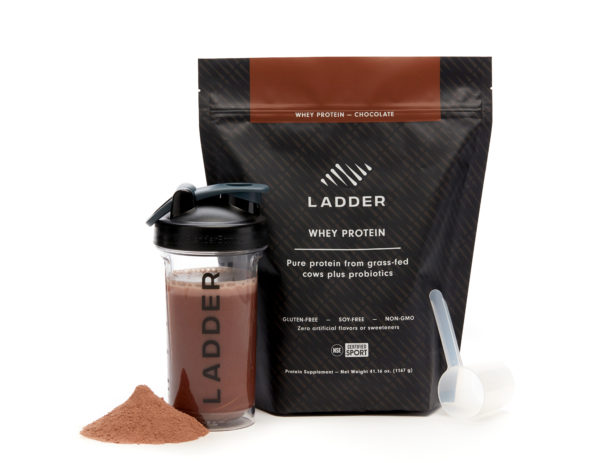
Ladder whey protein comes in two delicious flavors, chocolate and vanilla, that are 100% naturally sweetened without the use of artificial colors or flavors.
Since it is NSF-certified for sport, this protein powder is ideal for athletes, gym-goers are rally anyone who wants a clean and pure protein shake.
2. Ladder Plant Protein Powder
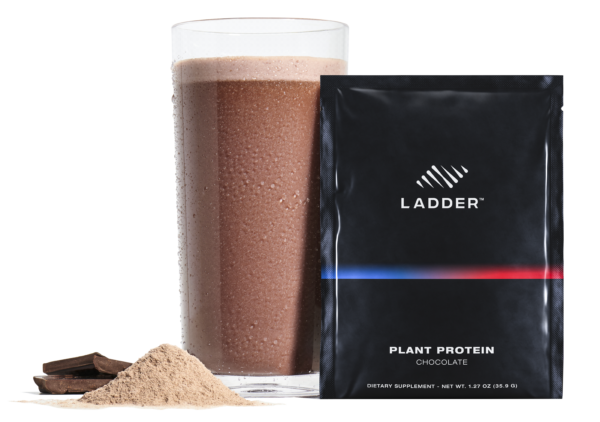
For those that prefer a plant protein shake, Ladder offers a plant protein powder that tastes delicious. In addition, it provides a full spectrum of essential amino acids to ensure that you are getting all the right building blocks to fuel your muscles.
Like it’s sister product above, this protein shake is also NSF-certified for sport and tested to ensure it contains no artificial ingredients, fillers or colors.
3. Exante
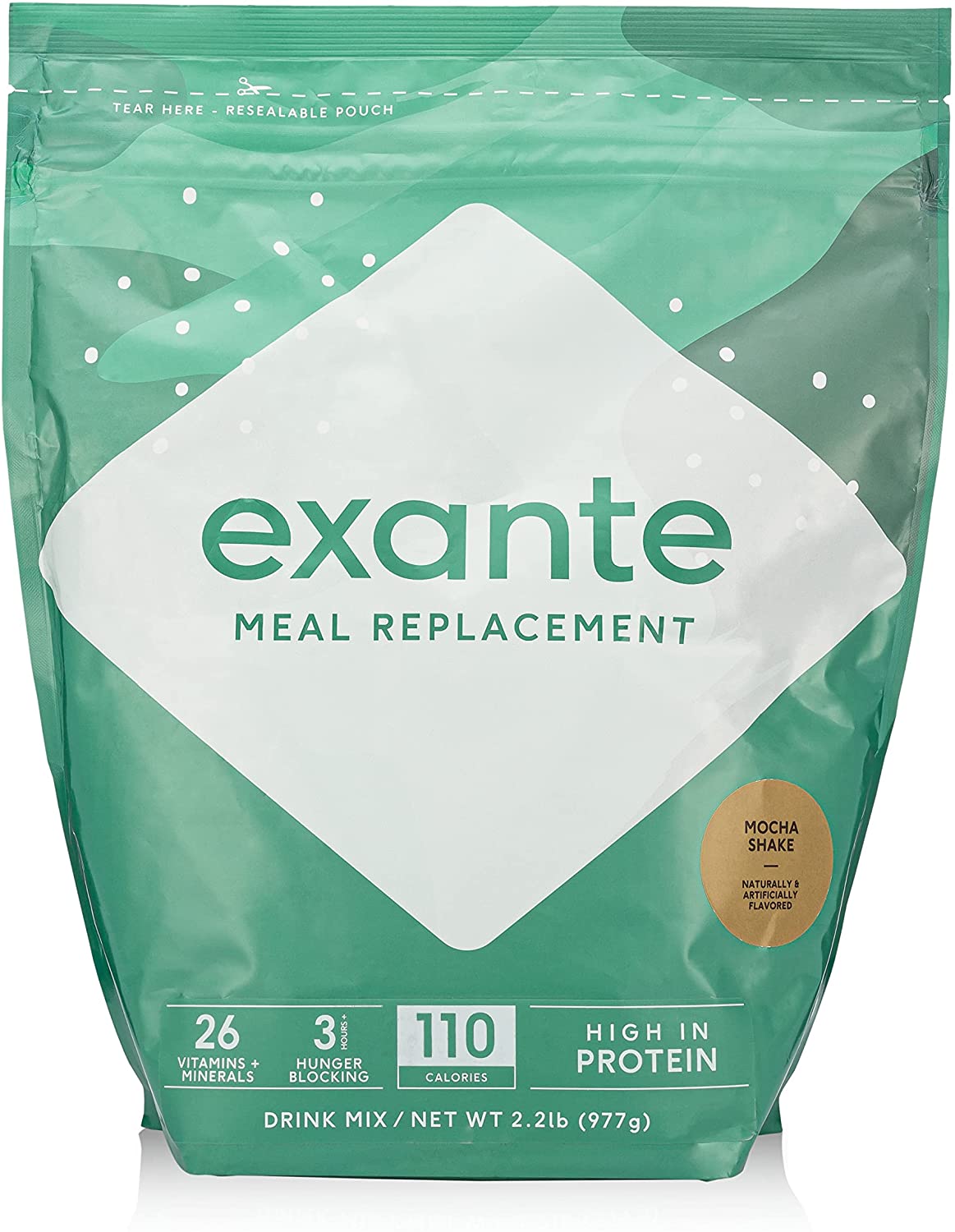
Click here for the lowest price
Exante does double duty as a protein shake and meal replacement shake: while it delivers its core nutritional value through whey protein concentrate, it also includes fiber, vitamins, minerals, and antioxidants. The inclusion of these added extras means it can support a lot of the nutritional functions that you’d otherwise have to rely on a meal or pre-prepared snack to get.
4. Vega One Organic
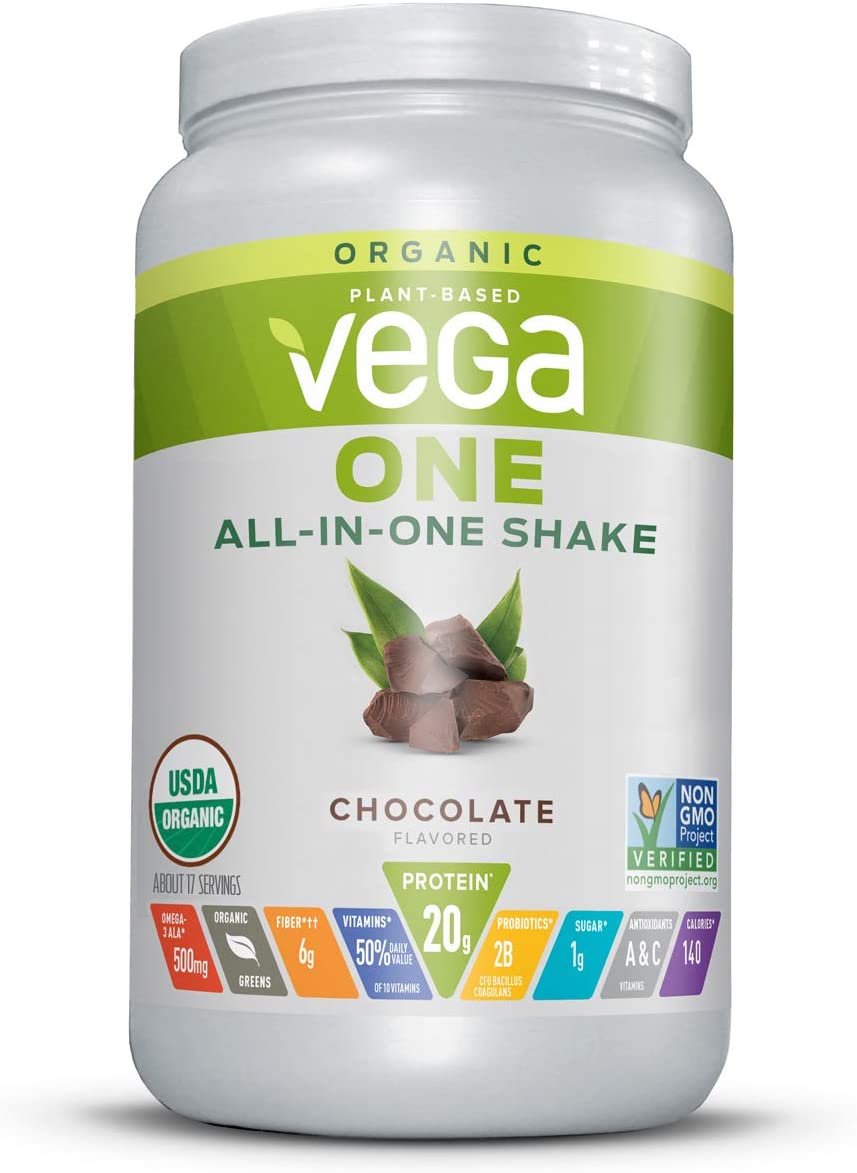
If you don’t do dairy because you’re lactose intolerant, allergic to dairy, or vegan, it can be hard to find a good protein shake.
For these people, Vega One is the top choice. Its protein content comes from pea protein, while its fruit and vegetable blend provides strong antioxidant power through powderized concentrates from ingredients like kale, spinach, and pomegranate.
Its vitamin and mineral content is excellent, and its sugar content is low, too, making this a fantastic pick if you want a plant-derived protein shake.
5. Fitmiss delight
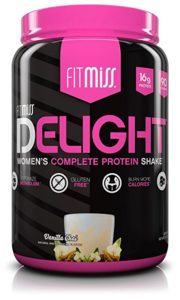
Fitmiss Delight is a protein shake designed especially for women. The protein content is varied, coming from whey, egg, casein, and potato protein.
It’s also got a robust mix of superfood extracts from things like blood oranges, broccoli, cherry, and red currant. These are supported by digestive enzymes to improve absorption and bioavailability of the nutrients in the shake.
To top things off, it’s got a large amount of vitamin B12 included to keep your energy levels high throughout the day. Of the protein shakes that aren’t pre-mixed, this is one of the best.
6. Muscle Milk Pro Series
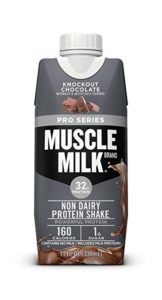
Muscle Milk is an excellent source of protein, and don’t let the name fool you—it’s not just for post-workout refueling.
It delivers an impressive 32 grams of protein per serving in the form of milk and casein protein, and aside from some flavoring agents, the only other ingredients are vitamins and minerals. Surprisingly, it’s one of the most focused, minimalist protein shakes out there, and its carb content is incredibly low.
7. Orgain Clean Protein
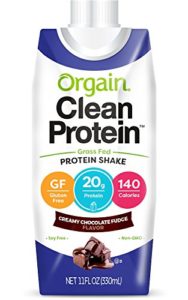
Orgain makes a pre-mixed protein shake that uses only grass-fed cows as a source for its milk protein concentrate. The sugar content is a little higher than normal, as it uses agave nectar as a sweetener alongside the natural non-caloric sweeteners monk fruit extract and stevia leaf extract.
Even so, each serving has only 4 grams of sugar (and 20 grams of protein). Unless you are a very strict low-sugar diet, this likely won’t be a dealbreaker. The use of only natural ingredients is a real draw for Orgain, though it hurts the vitamin and mineral content.
8. Premier Protein
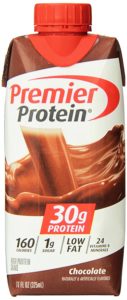
Premier Protein is a dairy-based protein shake that delivers a huge amount of protein per serving and provides the kind of vitamin and mineral balance you’d get from a standard multivitamin.
One shake delivers a quarter of your recommended daily intake of just about every important vitamin and mineral.
Though the artificial ingredients and preservatives may be a bit much for hard-line purists, it’s a good solution for just about everybody else who isn’t lactose-intolerant.
9. Atkins Protein-Rich Shake
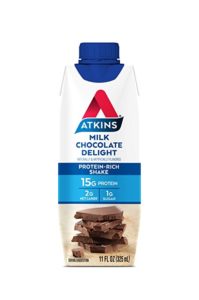
Milk protein and whey protein make up the bulk of the protein content of this protein shake, with soy protein pitching in as well.
As you’d expect from the brand, this protein shake is high in both protein and fat, while being very low in carbohydrates. Its fiber content is lower than some other competitors, so it may not be as filling, though the higher fat content—derived from sunflower cream—will partially make up for the lack of fiber when it comes to satiety.
10. Pure Protein Shake
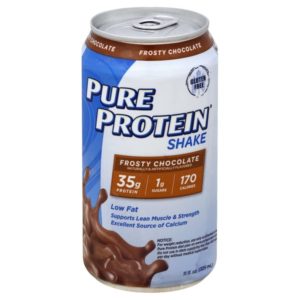
The Pure Protein Shake is a pretty standard mixture of milk protein and casein protein. It’s flavored with artificial flavoring and sucralose, a synthetic sweetener, and its vitamin and mineral content is fairly disappointing. Unless all you care about is protein content, this protein shake comes up a bit short on a number of fronts.
Category winners
Best protein shake overall: Ladder Whey Protein Powder
Ladder Whey Protein provides high-quality whey protein isolate alongside all-natural cocoa powder and stevia for flavoring. It’s a great protein shake whether you’re just mixing it up in water or alongside other ingredients in a more comprehensive blend, and thanks to its versatility, it’s our top overall pick.
Best protein shake for meal replacement: Exante
Exante is a protein shake that’s well-suited for use as a meal replacement, since it’s specifically formulated to leave you feeling full for several hours. It achieves this by supplying a high protein, high-fiber blend alongside 26 different key vitamins and minerals.
Best protein shake for women: Ladder Plant Protein Powder
Ladder’s plant-based protein formulation is great for women: its use of two different sources (pea and pumpkin protein) of plant-based protein ensures a complete amino acid profile, which helps cover all your bases if you’re using this protein shake as an easy on-the-go snack or meal replacement.
Best protein shake for athletes: Ladder Whey Protein Powder
Ladder Whey Protein is formulated by pro athletes, so it should be no surprise that it shines in this role. The whey protein isolate ensures that your muscles get rapidly-delivered amino acids for repair and recovery, and the NSF certification means you can count on its safety and purity.
Best superfood protein shake: Vega One Organic
Vega One Organic is a vegan-friendly protein shake that delivers pea protein alongside a huge array of superfood ingredients, including spinach, acerola cherry, kale, acai berry, and chia seed, just to name a few. With such a variety of ingredients, there’s no better option when it comes to protein shakes that boost their nutritional value with superfood extracts.
Best protein shake for weight loss: Ladder Whey Protein Powder
Ladder’s whey protein powder is our pick for weight loss, for two key reasons. First, it keeps the added carbs to a minimum, which is important for a healthy metabolism when you’re on a diet. Second, it uses quality animal-based protein, which is more effective at boosting both thermogenesis and satiety.
Who should buy protein shakes?
Protein shakes are generally safe for most people and help to improve muscle mass, weight loss, and metabolism. It’s exceptionally good at improving satiety on a diet as well.
People currently taking prescription medications should speak to a doctor before taking a protein shake, to be on the safe side. Diabetics, pregnant women and children should also be cautious when taking a protein shake supplement, as the safety is unproven in this population.
How we ranked
When ranking the best protein shakes, we first looked at the purity. Our top choices, like Ladder, ranked extremely well for providing one of the only protein shakes that is NSF-certified for sport. We also loved products that provided third-party lab testing and used no fillers, preservatives, or GMOs.
Next, we looked at the type of protein used. Whey protein isolate was our proffered animal protein choice due to its purity and low likelihood of causing GI distress. Plant protein powders that contain a full amino acid spectrum, like Performance Lab, also ranked exceptionally well.
Lastly, we looked at taste and flavoring. Protein shakes need to taste good, or else most customers won’t use it. However, we didn’t want the taste to supersede product quality. As such, we didn’t like products that used artificial sweeteners, colors, or ingredients. Products that used natural sweeteners like stevia and flavoring like natural cocoa powder and vanilla bean were ranked extremely well. We did make an exception for products that included xantham gum, as this helped improve flavor without causing harm to the body.
Benefits
A protein shake can replace a meal and still leave you feeling full. Protein shakes are excellent tools for weight loss because of their ability to make you feel full without requiring you to consume a lot of calories.
Like meal replacement shakes, they can accomplish this thanks to their high dosage of highly concentrated protein. According to research out of Maastricht University in the Netherlands, this effect is largely due to elevated amino acid levels in the body following a high protein meal (1).
Protein induces a feeling nutritionists call satiety, which is the post-meal feeling of fullness that makes you disinclined to eat more. The surge of amino acids into your body causes a release of hormones that make you feel less hungry, and when the protein content of a meal is high, it takes fewer calories to achieve this effect.
Protein shakes increase your energy expenditure. Consuming a large amount of protein all at once induces another biological response in your body termed thermogenesis.
Your baseline metabolic rate increases thanks to the energy that is required to break down the amino acids in protein. A study published in 1997 in European Journal of Clinical Nutrition tested the thermogenic effects of a low protein versus a high-protein meal in ten subjects (2).
The subjects received, in random order, either a high-protein, high-fat, or high-carbohydrate meal, and the researchers tracked the subjects’ baseline metabolic rate over the next seven hours. The high fat and high carbohydrate meals increased post-meal energy expenditure by just one-third that of the high protein meal.
A review article published in 2008 by researchers at Harvard’s School of Public Health analyzed these results as well as those of dozens of other studies, concluding that there is “convincing evidence” that high-protein meals create greater amounts of thermogenesis compared to low-protein meals (3).
Protein shakes can help you drop fat and maintain lean muscle. A study published in 2008 in the journal Nutrition & Metabolism examined the effects of a commercially available protein shake on body composition during a weight loss program (4).
Compared to a low-protein placebo shake, the group that received the protein shake lost more fat mass and preserved more lean body mass (i.e. muscle) during the 12-week study.
The authors hypothesized that the protein shake led to a more efficient “partitioning” of energy consumption, leading to the body burning fat and preserving muscle when it was in caloric deficit.
Maintaining weight loss is easier with a protein shake. Thanks to the thermogenic and satiety-inducing effects of protein shakes, they are great not just for losing weight, but for keeping weight off after you’ve lost it. This was the finding of a paper published in the International Journal of Obesity which studied over 100 subjects who underwent an intensive weight loss program, followed by a three-month weight loss maintenance phase (5).
Half the subjects supplemented their diet with 50 grams per day of extra protein, while the other half did not. The results showed that the protein decreased fat mass regain by 50% over the course of three months.
The authors suggested that the satiety-inducing effects of the protein was able to keep overall energy intake lower than the control group.
Side effects
Protein shakes may derive their dietary protein from different sources, but ultimately, they’re all natural foods. High protein intakes do not appear to be harmful, at least among healthy people.
A study in bodybuilders who were consuming nearly double the recommended dietary protein intake for athletes found no negative effects over the course of a week on their usual very high protein diet (6).
The only safety caveats are for people who are both obese and have type 2 diabetes. For these individuals, kidney function may already be compromised due to the effects of obesity and diabetes together.
As a result, certain types of protein (specifically, sulfur-containing amino acids) could raise blood pressure, and hence indirectly lead to an increased risk of heart disease (7). These people should talk to their doctor before taking large doses of protein for weight loss.
For the vast majority of people, though, even very high doses of protein are perfectly safe. And don’t forget, being overweight is also a risk factor for heart disease.
Recommended dosage
When replacing a meal, a protein dosage around 30 grams is the standard in scientific research. Conveniently, this is about the protein dosage of many of the top protein shakes on the market.
Studies on weight loss maintenance tend to use protein doses of 30 to 50 grams per day of supplemental protein, which works out to one or two protein shakes per day.
You can use these as mid-day meal replacements for lunch, or as a breakfast when you are on the go (or both). Given that one of the major benefits of a protein shake is the feeling of fullness it induces, it’s best to take protein in the morning or afternoon as opposed to the evening, when you’ve already eaten most of your calories for the day.
FAQ
What is a protein shake and why is it used? A protein shake is a premixed or powder form supplement that you can easily use as a meal replacement or as a post-workout pick-me-up to refuel, rebuild muscle, and stay lean.
They’re equally well-suited for athletes and people just looking to lose some weight. High doses of protein are particularly useful when it comes to losing weight and keeping it off, thanks to its thermogenic and satiety-inducing effects.
Protein shakes lean heavily on these mechanisms to ward off hunger and keep you burning calories throughout the day.
Can protein shakes cause weight gain? If you choose to do a protein shake diet, the aftermath could cause unwanted weight gain because of the restrictive nature of such a diet. If you are looking to put on muscle in the gym, simple protein powder and water mixture taken within 60 minutes of a workout, it can help aid your muscles during recovery and help build them over time.
Can I use protein shakes as a meal replacement? The protein shake diet requires that those participating drink two protein shakes for two meals over several weeks, including a balanced meal for dinner. It’s suggested that if you follow this method, you will kick up your metabolism, and it will result in weight loss.
Thermogenesis will result due to the protein shakes, and your body will naturally start burning more calories. Shakes that have high-fat content and low carbohydrate content are meant to keep you feeling satisfied for longer while maintaining a low-calorie intake. If you are choosing to follow a diet like this, which is often unsustainable for longer than a week, ensure it is medically supervised, and your doctor is on board with you completing this.
Can protein shakes cause bloating? If you consume too much protein in a day, around 2 grams per kilogram of body weight, you may experience some GI distressing symptoms, including bloating, indigestion, diarrhea, and nausea.
Managing the amount of protein you’re consuming is important to ensure you don’t take too much, including your dietary protein.
Can protein shakes be unhealthy? Pre-made protein shakes, or diet-specific protein shakes can contain unwanted added ingredients that aren’t healthy. The pre-made drinks on the market are designed to taste great, so people will buy them and try the diet.
There could be added sugar and processed ingredients, so ensure you’re reading the label to confirm what you’re consuming. Protein powders that are mixed with water are a much better option.
When should I consume protein shakes? You can consume protein shakes any time, but the recommended time is within 60 minutes of exercise to get maximum benefits for your muscles. Many people have protein powder in their morning smoothies or a shake before bed.
It’s not recommended to have a protein powder that is high in fiber, like hemp protein powder, right before bed, as it can cause interruptions in your sleep schedule.
Should I consume protein shakes if I am pregnant or breastfeeding? There is evidence to suggest that women require more protein in the later trimesters of their pregnancy. There are certain protein shakes that are more suited to pregnant women, and some that aren’t.
Plant-based organic protein powder would be a great option, whereas hemp-based protein powders should be avoided entirely. Consult your doctor before choosing a new protein powder to take during pregnancy.
Are protein shakes suitable for children? Children do not require as much protein as adults, and they should be able to get their recommended protein through their diets. Protein should be consumed with fresh vegetables, fruits, and hearty whole grains. If your child’s doctor recommends a protein supplement, they will suggest a suitable option for you.
Which protein shakes taste the best? Taste preferences will vary among individuals, but there are some great tasting options available for purchase. Many of these protein shakes are available for individual purchase, so you can try several different ones before committing to one you like.
Some of the most recommended protein shakes available are OWYN Plant-Based Protein Shake, Vega Protein Nutritional Shake, Garden of Life Organic Whey Protein, Sunwarrior Classic Protein, and Iconic Protein.
Can I consume protein shakes if I have diabetes? If you are diabetic and you’re looking to supplement your protein intake, you will want to opt for a low carb protein powder. Choosing a pre-made protein shake could have unwanted sugar and processed ingredients that can negatively impact your blood sugar levels.
Can protein shakes help build muscle? Protein shakes can aid in the recovery of muscles after a workout and help nourish them and help them grow. If you’re choosing the right protein for your goals, you can see great results.
A plant-based protein shake like soy, which is a complete protein, contains all of the essential amino acids your body needs from the diet. The BCAAs are the most important when it comes to muscle protein synthesis. In a 2017 study, participants who had 5.6 grams of BCAAs post-workout showed 22% more growth in muscle protein synthesis than those who took a placebo (8).
Choosing a protein powder that has an excellent BCAA content would be ideal, which could be a combination of both soy and dairy, studies suggest. There needs to be more research on which is best, but consulting with your doctor or dietician will help you determine which protein shakes are best for you.
Is a protein shake diet healthy? No. If you are partaking in a diet that includes two protein shakes as meals and one balanced dinner, you are not going to maintain any weight loss you achieve, because this way of eating is not sustainable.
If I am a runner, will I benefit from protein shakes? Protein shakes are the perfect addition to any post-workout routine. Whether that workout is resistance training or running, high-quality protein can help your muscles recover from vigorous exercise and facilitate growth.
Are protein shakes better than protein bars? Protein shakes, and protein bars each have their own set of pros and cons, and it comes down to personal preference. A protein shake will have a higher amount of protein per serving, but a protein bar will be more satisfying and have a better balance of nutrients, and it has more substance.
A protein shake may be better post-workout, but a protein bar is a better snack. Both are an easy and convenient way of getting more protein into your diet – and based on your lifestyle, you can choose which is best for you. Ensuring you choose high-quality products with little added sugar and processed additives will ensure maximum benefits.
Do protein shakes help my sleep cycle? There is no evidence to suggest that protein powders or shakes impact the sleep-wake cycle.
Can protein shakes help my eczema? There’s not sufficient evidence to suggest that protein shakes can help with chronic skin issues. Hemp protein powder may have a positive impact on the skin because of the extra minerals and healthy fats it has.
It includes omega-3, omega-6, and omega-9 fatty acids, which have been linked to promoting hair, skin, and nail health. It’s possible that these could help clear up negative symptoms associated with eczema, but there is much more research required before drawing that conclusion.
Can I consume protein shakes if I don’t consume dairy? There is a variety of plant-based protein shakes on the market. If you are lactose intolerant or vegan, there are plenty of options available to you.
Do protein shakes cause kidney stones? Increasing the amount of animal protein you consume can lead to kidney stones (9).
Are there keto-friendly protein shakes? Absolutely. There are plenty of low and zero-carb options on the market, including plant-based and options, including dairy.
What happens if I drink too many protein shakes? Consuming over the recommended dose of protein via shakes and protein powder can have negative effects on the body. If you happen to take too much one day, you may experience mild symptoms like nausea, dehydration, exhaustion, irritability, headache, indigestion, or diarrhea.
If you chronically over-consume protein, you can cause serious damage to your body. Consuming over 2 grams per kilogram of body weight can lead to cardiovascular disease, blood vessel disorders, kidney and liver issues, seizures, and these can lead to death. You may also develop certain cancers, type 2 diabetes, or osteoporosis. Before you add protein powder or shakes to your diet, you should consult your doctor or a registered dietician for clear dosage information based on your lifestyle and goals to prevent these negative side effects.
Can I make my own protein shakes at home? There is a variety of pre-made protein shakes available for purchase that may be enhanced with other nutrients and vitamins. You can make protein shakes at home with protein powder and water.
Should I be consuming protein shakes while on medication? There are no considerable interactions between protein shakes and prescribed medications, but there are so many products on the market, there could potentially be negative interactions between some. Please consult your doctor before introducing any protein supplement into your diet if you are on prescribed medication.
Should I be consuming protein shakes while taking other supplements? There are no notable interactions between protein shakes and other supplements unless they also contain protein. You don’t want to be taking too many protein supplements for fear of taking too much and causing negative symptoms. Please consult your doctor before combining supplements.
Related articles
- Low carb protein powder
- Protein powder for women
- Bone broth protein powder
- Vegan protein powder
- Meal replacement shakes
- Whey protein powder
Recap
There’s enough scientific evidence to say that high protein intake is critical for success when you are losing weight or trying to keep it off. Protein shakes are an excellent way to get a high dose of protein without much in the way of refined carbohydrates or sugars.
Thanks to the vitamin and mineral content of a high-quality protein shake, they function very well as meal replacements for breakfast, lunch, or a midday snack.
Taking between 30 and 50 grams of protein per day in the form of a protein shake is a sure-fire way to drop more fat mass, get strong, toned, and lean, and keep weight off once you’ve lost it.
For BodyNutrition’s #1 recommended protein shake, click here.